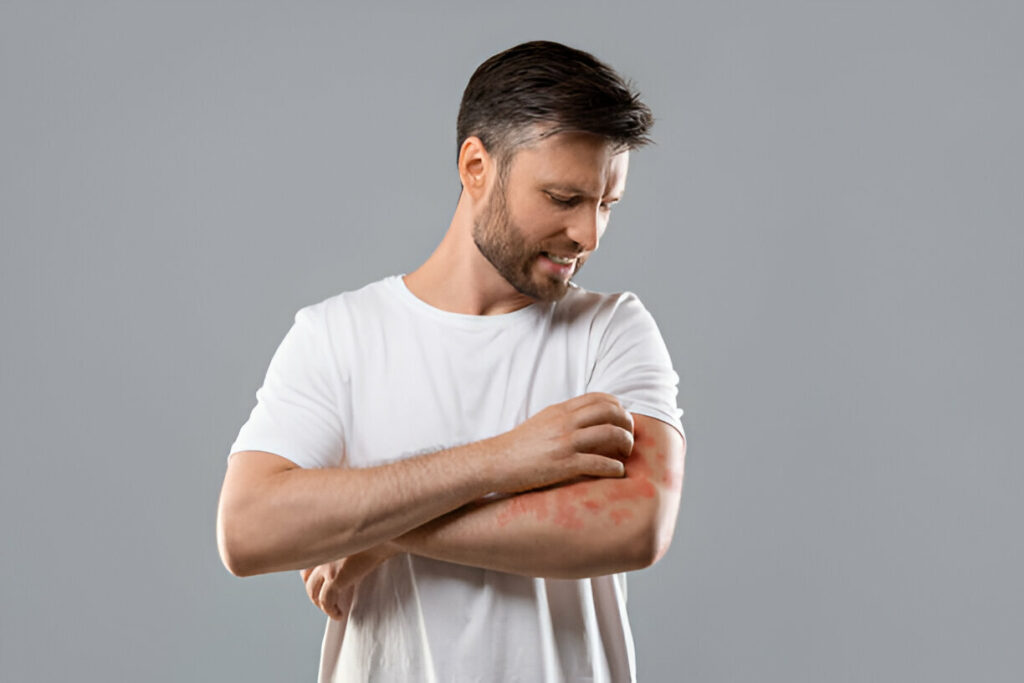108, Shangrila Arcade,
Nr. Shyamal Cross Road,
Satellite, Ahmedabad - 380015
Understanding Fungal Infections: Symptoms, Causes, and Treatments
Fungal infections are common skin conditions caused by various types of fungi. They can affect different parts of the body, including the skin, nails, and hair. While most fungal infections are not serious, they can be uncomfortable and require proper treatment to prevent spreading.
Common Types of Fungal Infections:
- Athlete’s Foot (Tinea Pedis)
- Symptoms: Itching, burning, and cracked skin between the toes.
- Causes: Moist environments, such as sweaty shoes and locker rooms.
- Treatment: Antifungal creams, powders, and keeping feet dry and clean.
- Ringworm (Tinea Corporis)
- Symptoms: Red, circular rashes with a clear center.
- Causes: Direct contact with infected individuals or animals.
- Treatment: Topical antifungal medications and maintaining good hygiene.
- Jock Itch (Tinea Cruris)
- Symptoms: Red, itchy rash in the groin area.
- Causes: Warm, moist environments and tight clothing.
- Treatment: Antifungal creams, powders, and keeping the area dry and cool.
- Nail Fungus (Onychomycosis)
- Symptoms: Thickened, discolored nails that may crumble.
- Causes: Fungal overgrowth in warm, moist environments.
- Treatment: Oral antifungal medications, medicated nail polish, and laser therapy.
Causes and Risk Factors
Fungal infections are typically caused by dermatophytes, yeasts, and molds. They thrive in warm, moist environments and can spread through direct contact with an infected person or surface. Some common risk factors include:
- Wearing tight, non-breathable clothing
- Walking barefoot in public showers or locker rooms
- Having a weakened immune system
- Living in a humid climate
Prevention Tips
- Keep your skin clean and dry.
- Wear breathable clothing and shoes.
- Avoid sharing personal items such as towels and shoes.
- Use antifungal powders or sprays in shoes and on feet.
- Practice good hygiene, especially after using public facilities.
To know more, follow this link: https://pmc.ncbi.nlm.nih.gov/articles/PMC10282148/
Treatment Options
If you suspect you have a fungal infection, it’s essential to seek medical advice. Treatments vary depending on the type and severity of the infection but commonly include:
- Topical Antifungals: Creams, ointments, and sprays applied directly to the affected area.
- Oral Antifungals: Medications taken by mouth for more severe infections.
- Home Remedies: In some cases, natural remedies such as tea tree oil, garlic, and apple cider vinegar may help, but they should be used with caution and under medical guidance.
At New Touch Skin Clinic, our dermatologists are experienced in diagnosing and treating all types of fungal infections. We offer personalized treatment plans to help you get back to feeling your best.
If you’re experiencing symptoms of a fungal infection, don’t hesitate to book an appointment with us today. Your skin health is our priority!
- Best Full Body Whitening Treatment
- Full Body Lightening Treatment
- Best Laser Hair Removal Clinic
- Permanent laser hair removal
- Hair Removal in Ahmedabad
- Melasma Treatment
- Naturopathy Treatment for Alopecia Areata
- Full Body Brightening
- Skin Lightening & Whitening
- Carbon Laser Peel
- Hydrafacial Treatment
- Anti-Aging Treatment
- Hair Transplant
- Body Contouring
- Tattoo Removal
- Hair Loss Treatment
- Facial Treatment
- Acne & Scar Reduction
- Laser Hair Removal

For Best Treatment
Get ConsultationConsultation Fee: ₹1000/-
(Consultation fee will be waived if you avail any service or purchase any product.)


